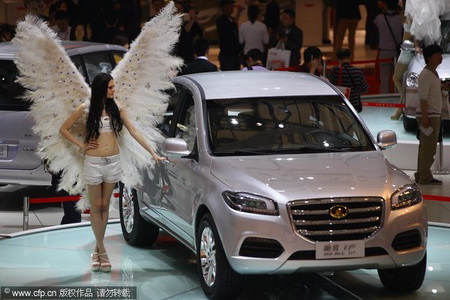Chinese automakers seek global growth
Updated: 2011-07-25 16:13
(Xinhua)
|
|||||||||||
|
 A model poses beside a Great Wall Hover 1F car during the media day of the Shanghai International Automobile Industry Exhibition at Shanghai New International Expo Center on April 20, 2011 in Shanghai, China.[Photo/CFP]
|
CHANGCHUN-- At the eighth China Changchun International Automotive Expo held last week in northeast China's Jilin province, prospective carbuyers seemed to be more interested in checking out foreign luxury cars than they were in looking at the domestic models provided by companies like Great Wall Motor.
Shi Liang, a regional sales manager with Baoding Great Wall Automobile Sales Co Ltd, a subsidiary of Great Wall Motor, outlined the company's sales strategy while attending the expo.
"We have been using a strategy of promoting sales in both domestic and overseas markets. We have currently established overseas vehicle assembly lines in Russia, as well as in regions in Asia, Africa and Latin America," Shi said.
The company's automobile exports rose 27.1 percent year-on-year to reach 34,197 vehicles, with June alone bringing a 47.9-percent increase, data from the China Association of Automobile Manufacturers (CAAM) showed.
Great Wall Motor isn't the only home-grown brand seeking growth in the overseas market amid intense competition back home. Encountering sluggish domestic sales, Chinese auto makers are increasingly going global to find new sources of growth.
Due to the removal of government incentives, new car purchase limits and rising oil prices, Chinese consumers are turning to joint-stock and luxury brands for better quality and performance.
To boost the economy amid the global economic meltdown, the government slashed car purchase taxes for small-engine vehicles from 10 percent to 5 percent in 2009, moving them back up to 7.5 percent in 2010. However, this policy ended at the end of last year.
Beijing also launched a car-quota system in January to combat its traffic woes, allowing only 240,000 new cars to be registered in the city this year, compared with the 800,000 new vehicles that took to the streets in 2010.
In contrast with a 3.35-percent increase in auto sales, the country's auto exports rose 56.99 percent year-on-year to hit 381,100 vehicles in the first half of this year, with June's exports hitting a record high of 80,000 units, according to the CAAM data.
During the period, auto exports for the private auto maker Chery Automobile Co Ltd jumped 88.5 percent year-on-year to 71,827 units, while those of Jianghuai Automobile Co Ltd (JAC), another private car manufacturer, surged by 254.97 percent to 35,500 units.
Chery said that it delivered a batch of vehicles to a police station in Serbia's city of Belgrade this year, marking the first time for a Chinese automaker to supply public service vehicles in eastern Europe.
"It's highly likely that auto exports will surpass the pre-crisis level of 680,000 units this year," Zhang Xiaoyu, vice president of the China Machinery Industry Federation, said Friday at a press conference concerning the development of China's machinery industry in the first half of 2011.
However, Zhang added that only a few automobile models, such as sedans and pickup trucks, have proven to be competitive in the overseas market.
The CAAM data showed that sedans and trucks accounted for 38.6 percent and 37.76 percent, respectively, of China's auto exports during the first five months of this year.
According to Shi, Great Wall Motor's pickup trucks and sports utility vehicles (SUVs) are selling well in Africa, Latin America and the Middle East.
Fu Yuwu, vice chairman of the Society of Automotive Engineers of China, said the domestic auto industry's ambition to expand globally is still in an early stage in terms of export quantity.
"Born just 55 years ago, the country's auto industry increased its production to 18 million units last year. However, exports account for just a small part of its total output," Fu said.
Liu Shaojun, vice director of the Ministry of Commerce's Industrial Department, attributed the slow progress to the absence of world-renowned Chinese brands.
"There are few globally recognized brands among home-grown auto makers. Some simply have no long-term plans for establishing a firm footing in the overseas market, while others have been weak in marketing and after-sales services," Liu said at the China Self-innovated Auto Expo, which was held on July 8.
Zhang shared Liu's view, but stressed that ensuring after-sales services is a major obstacle for Chinese automakers that are eyeing the overseas market."
"I once went to Peru and Chile, where Chinese trucks sold pretty well. However, some consumers complained that they had to wait three months just to replace a few accessories," said Zhang.
However, Zhang is very confident of the quality of the country's vehicles, as home-grown brands have made substantial progress in ensuring reliability in recent years.
"To promote the sale of home-grown brands, I have gone to international auto shows in countries such as Russia, Syria and Algeria six times since 2003. None of the vehicles we exhibited broke down during our 5,000-km-long promotional trip," said Zhang.
According to Zhang, another challenge for Chinese automakers is to meet emission and energy-consumption standards in the overseas market.
"It is a problem facing the entire machinery industry. In addition to cutting costs and enhancing quality, Chinese automakers have to improve their designs to meet these standards," Zhang said.
Despite growing pressures both at home and abroad, Chinese automakers still have many opportunities and advantages, Liu noted.
According to Liu, automobile trade accounts for nearly 10 percent of global trade. However, China's auto exports account for less than 2 percent of the world's total auto trade.
"Automobiles have some of the greatest growing potential out of all of the goods we export," he said.